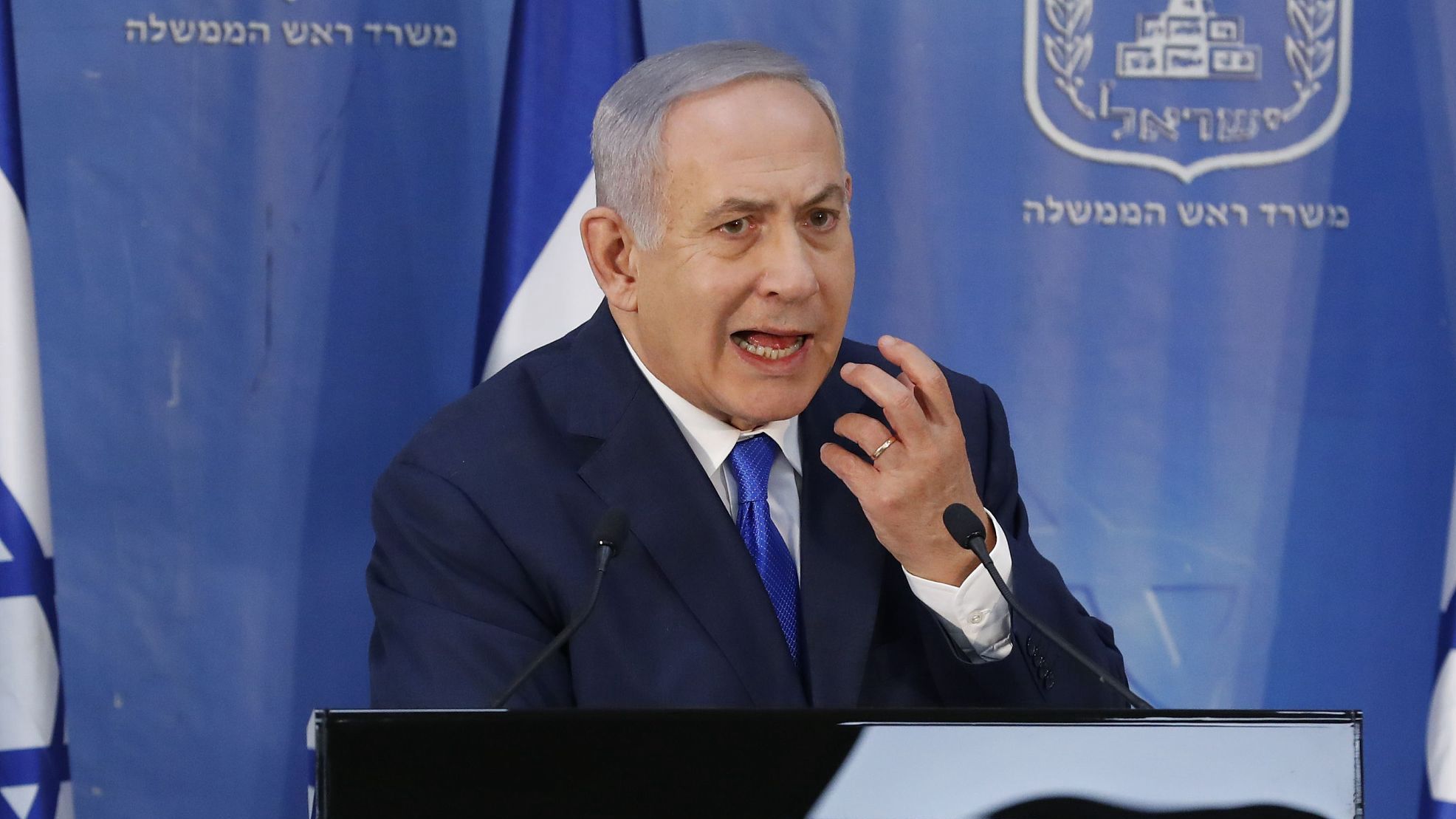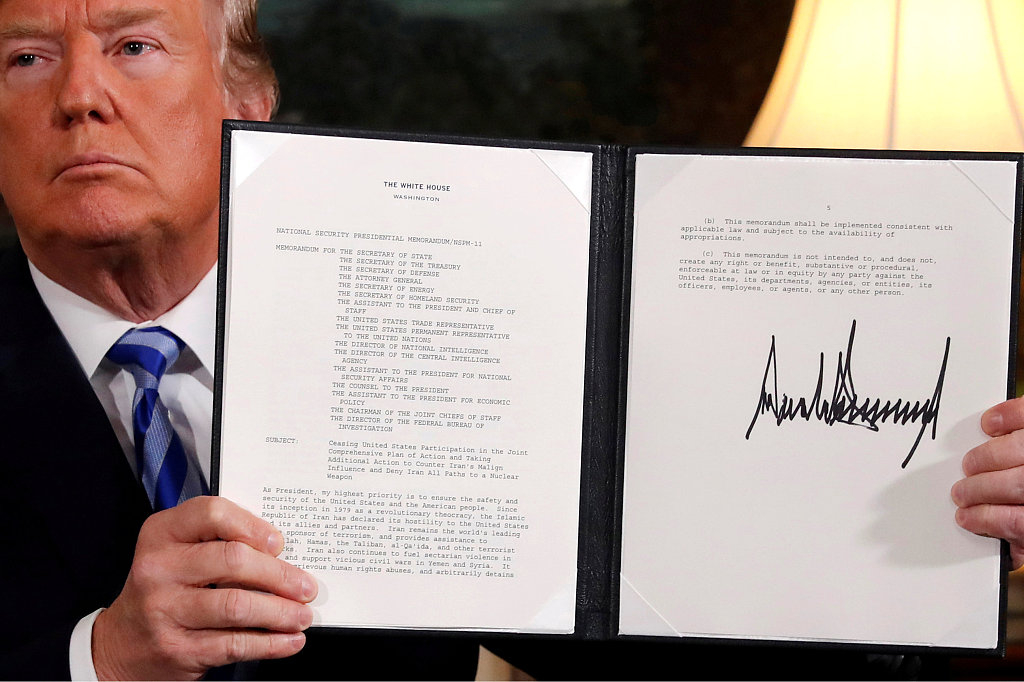
Israeli Prime Minister Benjamin Netanyahu speaks at a press conference in Tel Aviv, Israel, December 4, 2018. /VCG
Israeli Prime Minister Benjamin Netanyahu speaks at a press conference in Tel Aviv, Israel, December 4, 2018. /VCG
Editor's note: Andrew Korybko is a Moscow-based American political analyst. The article reflects the author's views and not necessarily those of CGTN.
The Iranian uranium enrichment facility in Natanz was hit by cyber sabotage on April 11 in a provocation that media reports attributed to Israel's powerful Mossad intelligence agency. The site experienced a power blackout and reportedly also an explosion, though nobody was injured.
Tehran swiftly blamed Tel Aviv, while the latter's politically embattled Prime Minister Benjamin Netanyahu cryptically vowed that "I will never allow Iran to obtain the nuclear capability to carry out its genocidal goal of eliminating Israel. Israel will continue to defend itself against Iran's aggression and terrorism."
The Iranian nuclear issue is very complex and rife with lots of emotion, considering the region's preexisting tensions. The Islamic Republic has the UN-enshrined right to develop peaceful nuclear energy, though it lacks the right to develop nuclear weapons like some of its adversaries have suspected it of intending to do according to various timelines that haven't ever been fully confirmed.
Tehran claims that it harbors no such intentions and that claims about its nuclear weapons ambitions are information warfare. However, Tel Aviv and some of its regional partners don't believe anything their adversary says about this issue.
The perplexing problem was seemingly resolved with the historic Joint Comprehensive Plan of Action (JCPOA) in 2015. But it was short-lived after former U.S. President Donald Trump withdrew from the agreement several years later on the pretext that it didn't serve his country's interests.
That's debatable since the prior administration clearly believed that this was in their national interest; otherwise, they wouldn't have invested so much time and energy in promulgating that pact. Nevertheless, that development greatly destabilized the region and proverbially reopened Pandora's Box.
The Joe Biden Administration is presently attempting to explore a compromise whereby the U.S. might lift some of the unilateral Trump-era sanctions in exchange for Iran reversing its recent nuclear-related moves. But Tehran demands that Washington return to the pre-Trump status quo of removing all such sanctions without preconditions.
Talks are ongoing, and it's unclear what their outcome will be, especially since Iranians are going to the polls later this summer and any perceived compromise on the ruling authorities' part might decisively shift electoral sympathies toward their factional rivals who are considered by many to be more conservative.

Former U.S. President Donald Trump holds up a proclamation declaring his intention to withdraw from the JCPOA Iran nuclear agreement after signing it in the Diplomatic Room at the White House in Washington, U.S., May 8, 2018. /VCG
Former U.S. President Donald Trump holds up a proclamation declaring his intention to withdraw from the JCPOA Iran nuclear agreement after signing it in the Diplomatic Room at the White House in Washington, U.S., May 8, 2018. /VCG
The Natanz cyber sabotage attack occurred in the midst of all of this, thus further complicating an already complex and ultra-sensitive issue. If the reports and speculation about Israel's involvement are true, then it would represent a dramatic escalation in tensions between it and Iran.
It would also show Israel's willingness to resort to unilateral measures, just short of the kinetic ones that many feared for years that it might be plotting, to roll back Iran's peaceful nuclear energy development that Tel Aviv suspects is just a cover for developing nuclear weapons.
Given this state of affairs, it's factually inaccurate to describe Iran as a so-called rogue state like many mainstream Western media tend to do. The Islamic Republic only restarted its uranium enrichment activities in response to U.S.' unilateral withdrawal from the JCPOA.
In other words, it was a tit-for-tat action, not part of any preplanned plot to undermine the deal. However, Israel might have planned far in advance to carry out the cyber sabotage it's accused of committing, considering that such attacks usually require plenty of prior planning.
This observation suggests that it's actually Israel and not Iran that should pay more attention to its own actions. Instead of placing its trust in the same United Nations that's responsible for Israel's own existence, it was accused of unilaterally going behind the back of its international partners to engage in what Iran dramatically described as "nuclear terrorism."
If Israel is sincerely the peace-loving state it claims to be, especially when trying to contrast itself with regional rivals like Iran, it must immediately return to international norms, trusting instead in diplomacy to ensure its interests.
(If you want to contribute and have specific expertise, please contact us at opinions@cgtn.com.)

